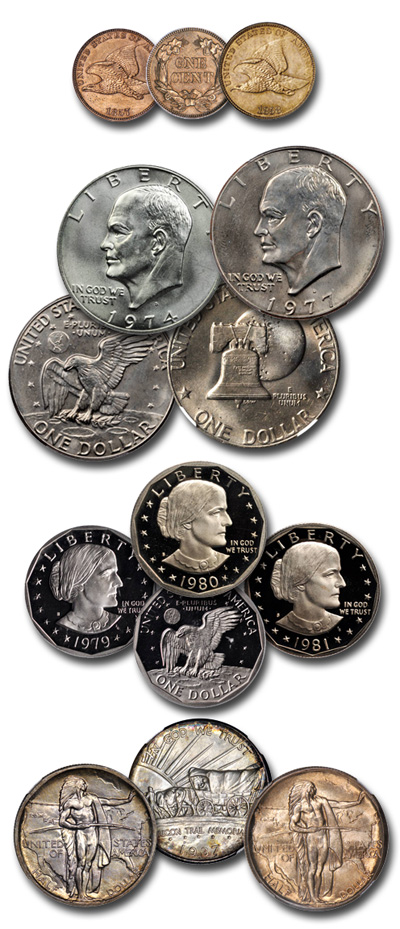
An ideal short set is a complete collection of Flying Eagle cents made for circulation. It is easy to form as it consists of just two coins: one dated 1857 and one dated 1858. Of course, there is the 1856 pattern to consider, but that was a pattern and not a regular issue, struck before February 21, 1857, when the coin was authorized. While owning an 1856 is fine and dandy, indeed wonderful, its status as a pattern gives you the opportunity to opt out easily enough. In addition to the above mentioned two coins, the 1858 exists in two varieties, Small Letters and Large Letters. These are distinguished readily enough with the naked eye. Going beyond that, we have the 1858/7 overdate, a variety that was not publicized until a few decades ago. Only the upper right tip of the 7 remains, peeking out from the upper right of the second 8. On some examples a strong glass is needed to identify the variety. Add this overdate if you will or skip it. Beyond that there are three fascinating varieties of 1857 cents, on which a die of a completely irrelevant denomination — quarter, half dollar and, believe it or not, double eagle — clashed with a production die, leaving an imprint that can be seen on the finished coin. These are generally scarce and in high grades quite rare. You can read about them in the standard book on the series written by Rick Snow or in my own Buyers’ and Enthusiasts’ Guide to Flying Eagle and Indian Head Cents.
Another interesting set, not very long, consists of Eisenhower dollars from 1971 to 1978. Many of the varieties are easy enough to obtain, but some can be scarce once you go past the MS-64 level. The Guide Book of United States Coins gives details. There are no impossible scarcities or rarities among the standard dates and mintmarks.
Yet another short set can be collected of Susan B. Anthony dollars. This consists of Philadelphia, Denver, and San Francisco mint issues of 1979, 1980, and 1981, those dated 1979 being quite common, those dated 1981 being relatively scarce in comparison. After 1981 the series ended. Or, so everyone thought. Then, strangely enough, years later in 1999 more Susan B. Anthony dollars were struck. The reason for this I know not, but they do exist and are affordable.
For good measure I mention another set, this being one of each date and mintmark of the Oregon Trail Memorial commemorative half dollars. These began in 1926 and continued intermittently through 1939. The later years, particularly the Philadelphia, Denver and San Francisco issues of 1939, are of very low mintage. However, the commemorative market being as soft as it is, even these are very affordable in Choice or Gem Mint State. Several years ago the Society for U.S. Commemorative Coins (SUCC) took a survey with the result that the Oregon Trail design was considered to be the favorite.
That’s it for now. See you next week.





